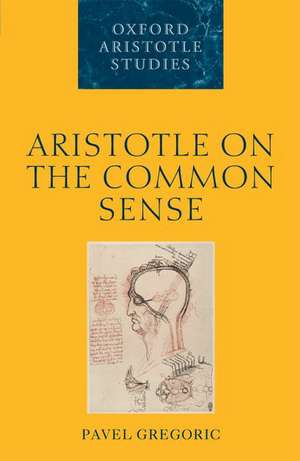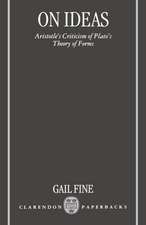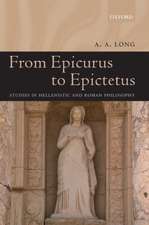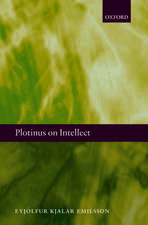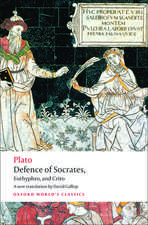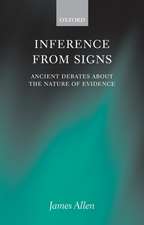Aristotle on the Common Sense: Oxford Aristotle Studies Series
Autor Pavel Gregoricen Limba Engleză Paperback – dec 2011
| Toate formatele și edițiile | Preț | Express |
|---|---|---|
| Paperback (1) | 310.91 lei 31-38 zile | |
| OUP OXFORD – dec 2011 | 310.91 lei 31-38 zile | |
| Hardback (1) | 728.72 lei 31-38 zile | |
| OUP OXFORD – 14 iun 2007 | 728.72 lei 31-38 zile |
Din seria Oxford Aristotle Studies Series
- 23%
 Preț: 467.33 lei
Preț: 467.33 lei - 17%
 Preț: 480.19 lei
Preț: 480.19 lei - 28%
 Preț: 473.71 lei
Preț: 473.71 lei - 10%
 Preț: 162.42 lei
Preț: 162.42 lei - 30%
 Preț: 676.73 lei
Preț: 676.73 lei - 21%
 Preț: 330.93 lei
Preț: 330.93 lei -
 Preț: 343.84 lei
Preț: 343.84 lei - 34%
 Preț: 611.82 lei
Preț: 611.82 lei - 27%
 Preț: 357.85 lei
Preț: 357.85 lei - 14%
 Preț: 330.26 lei
Preț: 330.26 lei - 34%
 Preț: 848.46 lei
Preț: 848.46 lei - 23%
 Preț: 415.58 lei
Preț: 415.58 lei - 23%
 Preț: 453.14 lei
Preț: 453.14 lei - 34%
 Preț: 727.05 lei
Preț: 727.05 lei - 30%
 Preț: 644.30 lei
Preț: 644.30 lei - 30%
 Preț: 721.01 lei
Preț: 721.01 lei -
 Preț: 339.41 lei
Preț: 339.41 lei - 14%
 Preț: 256.55 lei
Preț: 256.55 lei - 30%
 Preț: 659.80 lei
Preț: 659.80 lei - 28%
 Preț: 466.88 lei
Preț: 466.88 lei - 13%
 Preț: 247.07 lei
Preț: 247.07 lei - 22%
 Preț: 492.99 lei
Preț: 492.99 lei - 23%
 Preț: 455.83 lei
Preț: 455.83 lei
Preț: 310.91 lei
Nou
Puncte Express: 466
Preț estimativ în valută:
59.49€ • 62.11$ • 49.24£
59.49€ • 62.11$ • 49.24£
Carte tipărită la comandă
Livrare economică 24-31 martie
Preluare comenzi: 021 569.72.76
Specificații
ISBN-13: 9780199640096
ISBN-10: 0199640092
Pagini: 268
Dimensiuni: 141 x 215 x 14 mm
Greutate: 0.32 kg
Editura: OUP OXFORD
Colecția OUP Oxford
Seria Oxford Aristotle Studies Series
Locul publicării:Oxford, United Kingdom
ISBN-10: 0199640092
Pagini: 268
Dimensiuni: 141 x 215 x 14 mm
Greutate: 0.32 kg
Editura: OUP OXFORD
Colecția OUP Oxford
Seria Oxford Aristotle Studies Series
Locul publicării:Oxford, United Kingdom
Recenzii
Review from previous edition a learned, lucidly written, and compellingly argued treatment of its subject, one that surveys and helpfully synthesizes the immense ancient and modern literature on the topic. It also proposes some novel solutions to a number of long-standing textual and interpretative problems ... Students should begin their work on this issue here and experts should attend to it, as an undeniably original and important contribution to the scholarly conversation on this subject.
There has been little extended work devoted to the common sense, the faculty by which Aristotle thinks we coordinate and process the input of the five senses. The lacuna has now been filled by Pavel Gregoric's commendable monograph. This nuanced and original study represents a significant advance in our understanding of Aristotle's common sense.
Gregoric has produced a valuable contribution to our understanding both of Aristotle's philosophical terminology and of his theory of perception. Some of the texts he discusses in the book, such as De Sensu 7, have long been neglected, even though they provide substantive additions to and clarifications of Aristotle's theory. In discussing those and other texts, Gregoric provides us with well informed, detailed, and lucid interpretations, which, it should be added, are for the most part clearly correct and helpful. All serious students of ancient psychology should read this book. It will inform, illuminate, and stimulate.
Gregoric is no doubt right that this power deserves extended study, and his Part III accounts of its various functions are genuinely illuminating.
There has been little extended work devoted to the common sense, the faculty by which Aristotle thinks we coordinate and process the input of the five senses. The lacuna has now been filled by Pavel Gregoric's commendable monograph. This nuanced and original study represents a significant advance in our understanding of Aristotle's common sense.
Gregoric has produced a valuable contribution to our understanding both of Aristotle's philosophical terminology and of his theory of perception. Some of the texts he discusses in the book, such as De Sensu 7, have long been neglected, even though they provide substantive additions to and clarifications of Aristotle's theory. In discussing those and other texts, Gregoric provides us with well informed, detailed, and lucid interpretations, which, it should be added, are for the most part clearly correct and helpful. All serious students of ancient psychology should read this book. It will inform, illuminate, and stimulate.
Gregoric is no doubt right that this power deserves extended study, and his Part III accounts of its various functions are genuinely illuminating.
Notă biografică
Paul Gregoric is Assistant Professor of Philosophy at the Faculty of Humanities and Social Sciences, University of Zagreb.
